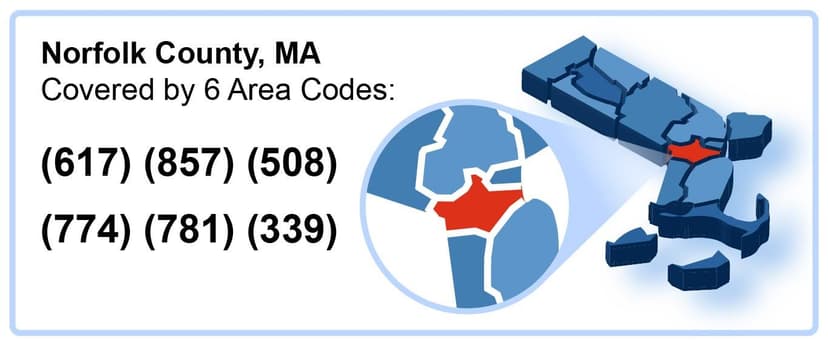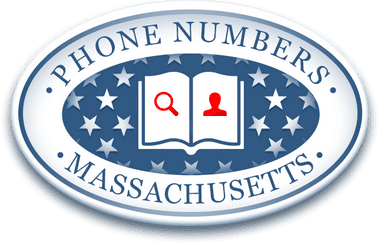What are Norfolk County Area Codes?

Following the introduction of the North American Numbering Plan (NANP), several Numbering Plan Areas (NPAs) were created with specific area codes assigned to each. An area code is the set of three numerical digits at the beginning of a 10-digit telephone number that identifies where it was registered. Area codes in Massachusetts are under the supervision of the Department of Telecommunications and Cable (DTC).
Six area codes currently serve Norfolk County. These are:
Area Code 617
Area code 617 is part of the initial 86 area codes created in 1947. It serves a small section of Norfolk County, with the primary service area being the other counties in Eastern Massachusetts. Norfolk County communities covered by this area code include Quincy, Brookline, and Milton.
Area Code 857
Area code 857 is a Massachusetts telephone overlay code created in 2001 as an overlay of the 617 NPA.
Area Code 508
Area code 508 emerged in 1988 from a split from the 617 NPA. It covers parts of Norfolk County, as well as other surrounding counties. Norfolk County communities served by this area code include Franklin Town, Medfield, Walpole, Foxborough, and Bellingham.
Area Code 774
Area code 774 is a Massachusetts telephone overlay code created in 2001 as an overlay of the 508 NPA. It covers the same communities.
Area Code 781
Area code 781 was activated in 1997 and covers Norfolk County and surrounding counties. Norfolk County locations under the 781 NPA include Dedham, Weymouth, Braintree, Randolph Town, Needham, Norwood, and Wellesley.
Area Code 339
Area code 339 is a Massachusetts telephone overlay code put into service in 2001 as an overlay of the 781 NPA.
What are the Best Cell Phone Plans in Norfolk County?
Wireless and VoIP telephony services are displacing landlines as the primary means of telecommunication countrywide, including in the Commonwealth of Massachusetts. A 2018 CDC survey reported that about 39.9% of Massachusetts’ adult population resided in homes that exclusively used wireless telephony services. The percentage of the adult population living in landline-only households was about 6.5%.
Wireless phone coverage is quite excellent in Massachusetts, with all the major networks providing service in the state. AT&T nearly covers all of the state and offers coverage of 99.9%. Verizon and T-Mobile are not far off with 97% and 94% coverage respectively. Sprint’s coverage in Massachusetts is at about 86%.
The emergence and rapid adoption of Voice over Internet Protocol (VoIP) is another reason traditional landline usage is rapidly declining in the nation. VoIP transmits voice and video calls over the internet. The internet offers flexibility and allows diverse functions at lower cost compared to landline and mobile phone services. Data from the FCC shows active VoIP subscriptions have surpassed that of landlines nationally.
What are Norfolk County Phone Scams?
These are fraudulent schemes devised by scammers aiming to extort money and steal personal information from Norfolk County residents using telephony services. Live calls, automated calls, and text messages are deployed in committing phone scams. The Office of Consumer Affairs and Business Regulation (OCABR) in Massachusetts named common scams in the state including the following:
What are Grandparent Scams?
Grandparent scams involve fraudsters impersonating their targets’ grandchildren. Scammers call elderly Norfolk County residents and claim to be their grandchildren in emergencies. The emergencies described often involve auto accidents, arrests, and kidnappings. Scammers use these emergencies to get the victims to send money immediately to save their distressed relatives. Residents who receive such calls should always confirm callers’ stories from others before responding. Use a phone number search to get details on an unknown phone number. Report grandparents scams to the Attorney General’s Consumer Advocacy and Response Division at (617) 727-8400 or file an online complaint.
What are IRS Scams?
Scammers claim to be officials from the Internal Revenue Service (IRS) and call Norfolk County residents to demand immediate payment of outstanding taxes. These criminals threaten their targets with arrest, deportation, and business license withdrawal if they do not make payments immediately. Authorities continuously warn that the IRS does not use the phone as the first point of contact with tax defaulters. The IRS will also never insist on immediate payments or threaten taxpayers to obtain their compliance. Report this scam online by contacting the Treasury Inspector General for Tax Administration (TIGTA) or calling 1 (800) 366-4484. Alternatively, use the Federal Trade Commission complaints assistant platform to report IRS scams.
What are Utility Scams?
Fraudsters call Norfolk County residents and introduce themselves as representatives of utility companies. They threaten to disconnect services if victims do not clear outstanding bills. Such scam calls also target residents with no overdue bills. These fraudsters demand payment via reloadable debit cards, gift cards, and other untraceable means. Report utility scams to the utility company impersonated, local law enforcement, and by using the FTC’s complaints page.
What are Charity Scams?
These scams involve fraudsters posing as representatives of real or phony charitable organizations to seek donations. The scammers exploit the generosity of Massachusetts residents to steal funds from unsuspecting residents. If the targets accede to the requests and make donations, the funds get diverted to the criminals’ accounts. Perform a reverse phone lookup and get information on the registrant of an unknown number to avoid falling victim to this scam. Authorities advise Norfolk County residents to verify the authenticity of any charity before making donations. Report charity scams online to the Public Charities Division of the Attorney General’s Office or call (617) 727-2200.
What are Lottery Scams?
Residents get calls from unknown individuals claiming they won lotteries, sweepstakes, and free prizes. These callers demand certain fees before releasing the claimed winnings claiming to require them for tax and shipping purposes. However, victims of this scam get no reward even after making the required payments. Using a reverse number lookup service to discover the person behind the unknown number can prevent this scam. Verify the authenticity of any notification on lottery wins from the Massachusetts State Lottery. Victims of these scams can call (617) 973-8787 to report this scam to the OCABR or file reports with the Attorney General’s Office online.
What are Robocalls and Spam Calls?
Scammers sometimes use automated dialers to place random calls to Norfolk County residents that relay pre-recorded messages. These automated phone calls are called robocalls. They were initially developed to help telemarketers reach a large number of potential customers. However, scammers have adopted robocalls to target and deceive residents into parting with money or private information. The OCABR reported about $1 billion was lost to robocalls in 2018 alone.
The fight against the robocall menace led to the signing of the Telephone Robocall Abuse Criminal Enforcement and Deterrence (TRACED) Act. Phone manufacturers are also making efforts to curb robocalls and spam calls by introducing features to detect suspected spam calls and block them. Network operators also provide call filtering and call blocking tools to subscribers, sometimes as premium services.
Some steps to take to reduce the frequency of robocalls and stop spam calls include:
- Ignore calls from unknown numbers. Let such calls go through to voicemail and weed out suspicious callers from there.
- Set up your voicemail password to secure it against hacking by spoofed numbers.
- End any robocall you inadvertently picked.
- Do not press any button as instructed by the voice prompt of a robocall. This prompt verifies your number as active and leads to more robocalls.
- Place your number on Massachusetts Do Not Call List and the National Do Not Call Registry. You can also dial 1 (888) 382-1222 from the number you want on the National Do Not Call Registry to register it.
- Report robocall abuses to the FTC.
How to Spot and Report Norfolk County Phone Scams?
Norfolk County residents should be cautious during interactions with unknown callers that involve any of the following red flags:
- Sudden distress calls from distant relatives requiring financial aid for emergencies should be treated as suspicious by residents. Confirm the whereabouts of the relative before responding to any requests.
- Hostile and threatening calls from the IRS or utility companies seeking immediate payments for outstanding debts are usually from scammers.
- Solicitors for charities requesting that checks be written in their names instead of the charities are suspicious. Checks must be written in the name of the charities involved.
- Any requests that residents pay certain fees before redeeming alleged lottery or prize winnings are dubious and most likely scams.
- Insistence on making payment through irregular channels such as gift cards or wire transfers are suspicious. They are scammers’ preferred means because funds sent through these means are hard to trace and recover.
Norfolk County residents can spot suspicious activities indicative of phone scams by being wary and learning the various tactics used by scammers. The following government agencies provide Norfolk County residents with regular scam alerts. The agencies also provide platforms to report various phone scams.
Norfolk County Sheriff’s Office provides scam prevention programs to elderly residents of Norfolk County. Dial (781) 329-3705 to report scams to the Sheriff’s Office or send an email.
Massachusetts Office of Consumer Affairs and Business Regulations (OCABR) issues regular scam alerts to help residents easily spot and avoid phone scams. The OCABR also manages Massachusetts Do Not Call List. Norfolk County residents can subscribe to receive regular consumer alerts (including scam alerts) from the OCABR. Call (617) 973-8787 to report phone scams to the OCABR or send an email.
The Federal Communications Commission (FCC) oversees the telecommunications industry. They provide resources on how to identify spoofing and activate call blocking to help residents avoid phone scams. The FCC has mandated telephone carriers to improve caller authentication technology that will help eradicate spoofing. Report phone spoofing and other phone scams to the FCC by submitting complaints online.
The Federal Trade Commission (FTC) protects consumers’ interests and promotes fair trade. Their guides help residents identify common phone scams and avoid robocalls. The FTC manages the National Do Not Call Registry that notifies legitimate telemarketers not to robocall any number on the list. The FTC provided the online complaints assistants page to collate reports on phone scams.
